
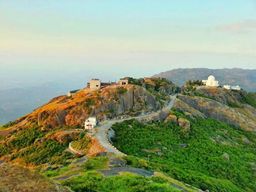
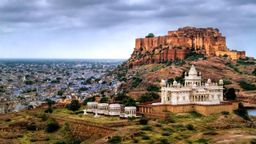
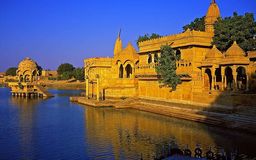
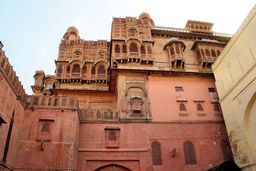


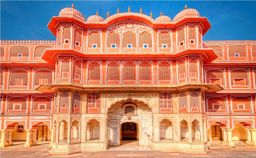
Today arrive at Jaipur and transfer to your hotel. The capital of Rajasthan Jaipur - popularly known as the “Pink City” as the Pink sandstone was used to construct the buildings in the old walled city. Jaipur owes its name; it’s foundation and it’s planning to the Great-warrior-Astronomer Maharaja Jai Singh II (1699–1744 AD). Jaipur (City of Victory) was founded by Maharaja Sawai Jai Singh II in 1727. It is the only city in the world symbolising the nine divisions of the Universe through nine rectangular sectors sub-dividing it. The architect who formalised the city’s plans on the Shilpa Shastra, the epic Hindu treatise on architecture, mixed it with the sublimity of the Mughal and Jain influences of those times. The city was painted pink in 1853 in honour of the visit by Prince Albert. Except for the busy traffic of bicycles, cars, and buses, little seems to have changed.
Overnight at Hotel
Later visit the City of Jaipur. Among the highlights to be seen while touring Jaipur include the City Palace, which is an overwhelming complex of exquisite palaces, gardens and courtyards, decorative art and carved doorways. The palace museum houses collections of rare manuscripts, armours, costumes, carpets and miniature paintings. Walk to the adjacent Jantar Mantar or Astronomical Observatory made by the Maharaja of Jaipur, built in 1726 and is one of the five such astronomical wonders built by Sawai Jai Singh and makes accurate predictions even to this day. Jaipur is a shopper’s paradise. Most of the bazaars are in an old city with a wide range of things to buy, from jewellery (precious and semi-precious stones and handcrafted silver) to textiles to handicrafts and antiques. No doubt, for an avid shopper “Jaipur” is the choicest of the city to shop and collect memorabilia.
Overnight at Hotel
After the breakfast you will drive to Bikaner; Arrive Bikaner & transfer to your hotel. This desert town in northern Rajasthan was founded in 1488 by Rao Bikaji. Like many others in Rajasthan, the old city is surrounded by a high crenellated wall. The old city with its exquisite merchant havelis, temples and bazaars retain a medieval air.
Later proceed for city tour of Bikaner visiting Junagarh Fort, one of the most interesting forts in Rajasthan, with its sumptuously decorated interiors. Built in 1588 by Raja Rai Singh it is unusual in the sense that it was one of the few major forts of Rajasthan that was not built on a hilltop. Instead, it was built on the desert plains; its rugged sandstone bastions and graceful pavilions and balconies are silhouetted against the sky.
Overnight at Hotel
After breakfast drive to Jaisalmer; Jaisalmer - a fairytale town in the Thar Desert founded about 800 years ago by Rawal Jaisal. Unlike any other city, this desert fortress is one of Rajasthan's most exotic and unusual towns. Jaisalmer, an important ancient trading centre because of its strategic location on the camel trade routes, is often described as the 'golden city'.
The havelis, built by merchants of the 19th century, are exquisitely carved from golden-yellow sandstone and are still in a beautiful condition. The fort built by Rawal Jaisal in the 12th century, stands on the 80-meter-high Trikuta hill, with beautifully carved Jain temples. The annual desert festival takes place in January and February each year and is a riot of colour and activity. Jaisalmer is also famous for its embroidery, Rajasthani mirror work, rugs, and blankets, antique, silver jewellery,
Overnight at Hotel
After breakfast leave for the city tour of Jaisalmer. Visit the famous Havelis (mansions) known for their frescoes. Jaisalmer's strategic position on the camel terrain route bought it great wealth. The merchants grew prosperous and commissioned great havelis, or mansions, to flaunt their ever-growing status in society. Made of local golden-yellow sandstone and wood, some of the havelis are still in excellent condition. The most elaborate and magnificent of all the Jaisalmer havelis is the Patwaon Ki Haveli. Five Jain brothers built the Haveli between 1800 and 1860. Salim Singh Ki Haveli and Nathmal Ki Haveli are the other two havelis that are open to visitors.
Built in 1156 by the Bhatti ruler, Jaisal, The Fort here stands atop the 80 m high Trikuta hill. 3 walls and 99 bastions surround the fort. Over the centuries, the golden sandstone fortress witnessed many battles between the Bhatti Rajput’s, the Mughals and the Rathore’s of Jodhpur. Within the fort, complex is the beautifully carved Jain Temples built between the 12th and 15th centuries. The Maharawals (rulers) of Jaisalmer were devout Hindus but were tolerant of Jainism and encouraged art and religion. There are 7 temples in the complex - Chandraprabhu, Parasnath, Shitalnath, Sambhavnath, Shantinath, Kunthunath and Rikhabdev Temple.
The temples are all connected by a series of corridors and walkways. Close by is the Gyan Bhandar, a library founded in 1500 A.D. This houses priceless ancient manuscripts and other exhibits like astrological charts, besides the Jain equivalent of the Christian Shroud of Turin.
In the evening, proceed to Sam Sand dunes. Located at 42 kilometers from Jaisalmer, Sam Sand Dunes is the closest point to witness the total sandy desert. You can also see the patterns and motifs created by the shifting sands and air. Moreover, Sam Sand Dunes also provide you with an unforgettable experience of camel rides – on direct payment and the sunset.
Overnight at hotel
After breakfast drive to Jodhpur - Arrive at the Blue City – Jodhpur and transfer to your hotel.
An oasis in the arid Thar Desert, Jodhpur is the second largest city in the state of Rajasthan. Representing this colourful city with shades of blue, Jodhpur has a history that is rich and a present that beckons strongly to the discerning tourist. Forts and palaces, temples and havelis, culture and tradition, spices and fabrics, colour and texture, Jodhpur has them all and in plenty. Situated in Western Rajasthan, Jodhpur has long attracted both the domestic and international tourist. It not only offers tangibles, in terms of what you can see and buy but also fills one with a sense of history and the splendour of an era gone by. The hospitality of the locals, the demure women, and the colourful turbans -all set against the beloved desert (Marwar) is something to feel, not just see. Every pore of Jodhpur tells its own tales of heroic deeds that made legends out of kings and soldiers, romances that continue to warm the heart and a time when epics were lived out on the streets by everyday man.
Later proceed for half day city tour of Jodhpur. Visit the Mehrangarh Fort, situated on a low sandstone hill. The palace apartments like Sukh Mahal, Phool Mahal, and Sheesh Mahal etc are beautifully decorated and house jewellery, costumes, armoury, palanquins, howdahs and other remnants of the past. See the Jaswant Thada, an imposing marble memorial to Maharaja Jaswant Singh II built in 1899. Later the royal crematorium and three other cenotaphs were also built here. Also visit Sardar Bazaar and Clock Tower markets where you can see the vegetable, spice, Indian sweets, and textile and silver markets. These colourful markets with tiny shops dot the narrow lanes replete with woodcarvings, wrought iron, lacquer work, silver and ivory ornamentation and leather handicrafts.
Overnight at Hotel
After breakfast drive to Mount Abu enroute visiting Ranakpur which is the largest Jain temple complex in India and dates to the 15th century. The main temple is dedicated to Adinath, the first Tirthankar. Intricate carvings detail mythological figures, patterns, and motifs on the walls, pillars and domes. There are 1444 ornately carved marble pillars in the complex and none of them are similar. The beautiful lace-like interiors of the domes are a superb example of western Indian temple style. Surya Temple and other Jain Temples are sided attractions. (Temples open only at 1200 Hrs. Leather belts, footwear, bare legs and black clothing not allowed)
Later continue to drive to Mount Abu; Arrive Mount Abu and transfer to your hotel At 1200 meters, Mt. Abu is the highest point of the Aravalli Range passing through Rajasthan. The only hill resort of Rajasthan, it is built around a lake and is surrounded by forested hills. According to a legend, the place derives its name from Arbuda, a serpent who descended to the spot to rescue Shiva’s bull, Nandi. Besides having all the features of a pleasant hill resort, Mount Abu is also a center of pilgrimage for Jains on account of the famous Dilwara Temples. There are interesting treks and picnic spots, romantic royal retreats of various erstwhile royal families, and some relics of the Raj period.
Later proceed for city tour of Mount Abu. Visit the breath taking Dilwara temples, among the finest examples of Jain architecture with their superb marble carving. The complex consists of five temples built between the eleventh and thirteenth century. The intricate ornamental carvings here represent the great heights reached in stone decoration. Also, visit Nakki Lake, and see the strange rock formations around it including Toad Rock. The Achalgarh fort has the famous Achaleshwar temple and provides superb views of the area.
Overnight at Hotel
After breakfast drive to Udaipur; arrive Udaipur and transfer to your hotel. Set on the shores of Lake Pichola and surrounded by hills, Udaipur grew in complete contrast to the harsh deserts of the rest of Rajasthan. As the capital of the old Mewar State, it was the only Rajput stronghold to uphold its Hindu allegiance in the face of Muslim invasion. This fairy – tale city, with its marble palaces and lakes surrounded by a ring of hills, was founded by Maharana Udai Singh in 1559. The city is dominated by massive City Palace, which overlooks Lake Pichola with its romantic island palaces. Picturesque havelis, ghats, and temples line the lake front, with the lively bazaars of the old walled city stretching behind them.
Overnight at Hotel
After breakfast proceed for half day city tour of Udaipur – visiting the City Palace and Museum. The largest palace complex in India, it is a blend of Mughal and Rajput influences. Also, see the 17th century Jagdish temple, drive around the Fatehsagar Lake, and visit the Sahelion ki Bari (the Garden for the Maids of Honour), an ornamental pleasure garden with fountains and marble kiosks. Later visit the Bharatiya Lok Kala Mandir or the Folk-Art Museum.
Later in the evening take a boat ride – on direct payment on the 4 km long and 3 km wide Lake Pichola, which is fringed with hills, palaces, havelis, ghats, embankments and temples and offers spectacular views of the city. Visit the Jag Mandir Island with its exquisite Gul Mahal Pavilion.
Overnight at Hotel
After breakfast drive to Ranthambore enroute visiting Chittorgarh said to have been originally built by Bhim, one of the Pandavas. Though deserted now, impressive reminders of its grandeur still stand. See Rana Kumbha’s palace and Fateh Prakash Palace. Visit the 37 m high Jaya Stambh (Tower of Victory) built by Rana Kumbha to commemorate his victory over Khiljis of Malwa in 1440.Also see the 22 m high Keerti Stambh or Tower of Fame, dedicated to Adinath and decorated with figures of various Jain Tirthankaras.
Later continue to drive to Ranthambore; Arrive Ranthambore and transfer to your hotel. The park is one of the finest tiger reserves in the country where more visitors spending a couple of nights are likely to spot one of these majestic animals, The Royal Bengal Tiger. Once, private tiger reserve of the Maharaja of Jaipur, in 1972 the sanctuary came under the Project Tiger scheme. It covers 410 sq. km and runs from the easternmost spur of the Aravalli to the Vindhya Range. It has both the old fort and the wildlife sanctuary, also known as Sawai Madhopur, after the town, which has some Jain temples with gilded paintings. Apart from tiger, you can see herds of Chital and Sambar deer and sounders of wild boar, Nilgai antelope, and Chinkara gazelles. There is also sloth bear, a few leopards, and crocodiles. Extensive bird life includes jungle fowl, partridges, quails, crested serpent eagle, woodpeckers, flycatchers etc. There are also water birds like storks, ducks, and geese at the lakes and waterholes.
Overnight at Hotel